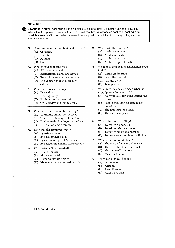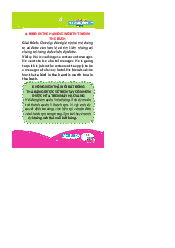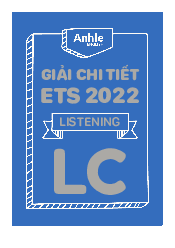





Preview text:
The line chart illustrates the alteration in how many people in three specific nations migrated
from country to metropolis, calculated by millions of people, throughout several years from
2000, and the estimated number until 2025.
Overall, what stands out from the chart is that there was an upward tendency in the numbers of
migrants in all countries. It is also explicit that Iranians witnessed by far the most dramatic
increase of the three countries in the equivalent figure over the timespan.
It reveals in the year 2000 that people in Russia who moved out from the rural areas were in
majority, accounting for 15 million, roughly over twice as high as those in Iran. When the time
went by, it was until 2020 that Iranian migrants experienced a striking growth of 71 million and
overtook Russian ones to be ranked in the first place. As can be seen in 2025, there is an
expectation that the figure for Iran will hit the peak ofat 95 million and go on to be the leading
country. When it comes to Indonesia, the number of rural dwellers moving to the urban areas
sawwas a three-fold rise (30m), compared to the year 2020 (10m). Despite the go-up, it is
expected that Indonesian migrants will remain relatively unchanged in the equivalent figure and
stand at 30 million after five years. thien van very good
On the one hand, I advocate the benefits of the Internet are vividly recorded on both social and
individual implications. In terms of personal aspects, cyberspace is more likely to help people
access information through its convenience and flexibility. In fact, all the gadgets such as
textbooks, audiobooks, and videos are converted into digital formats, which that allows all
walks of life from the underprivileged to the elite class to access information through personal
devices. As a result, such a practice it paves the way for readers to widen their horizons about
knowledge to cultivate sustainable eco-society. Moreover, by going online people can read
multi-language materials fulfilled from their homes in building linguistic proficiency. To illustrate,
linguistic learners can attend free-of-charge online learning apps instead of face-to-face
courses. Consequently, it could be beneficialbenificial to save money s fromfor costly commuting
while still allowing the bookaholics to exchange knowledge easily. van
Quthanh-On the one hand, i favor that the benefits of the Internet are vividly recorded on both
social and individual implications. Internet is regarded as ato a fresh breeze which can play a
significant role in reading culture. In fact, most of the paper-delivered document materials has
beenhad converted into digitalinto the digital formats so it is convenientconvenience and
flexibleflexibility for all walks of life to access and improve their horizons about various fields
knowledges. That is obviously also a base for a sustainable economic development society.
Moreover, linguistic proficiency is undoubtedlyundoubted taken into consideration. In fact, It can
help the underprivileged to gain the needed information without attending the priceypricy face-
to-face courses butor search for searching the documents on free-of-charge website . s
Thảo Vi + Anh Thư Proponents of the internetof internet advocate that the benefits of looking up
information on cyberspace are vividly recorded on both individual and social implications. In
fact, it is’s relatively comfy and handy because most learning material including textbooks,
audiobooks, and so forth... have would been converted intoto digital formats. So the argument
goesTo be more specific, all walks of life from underprivileged to elite classes have an
opportunity to access the various sources of mankind knowledge. As a result, it enhances
readers’ horizon in terms of all diverse (adj)diversity aspects, (which could be) regardeding as a
leverage for sustainable economic development.
UYEN TAM- On the one hand, I hold a firm belief that searching the information via the Internet
is essential in the basis of its convenience and flexibility. In fact, the myriad of textbooks, audio
tracks, videos, and tutorialstutorials have beenare transferredtransfered into digital formats in
order for allto all walks of life from underprivileged to elite classes to standclasses stand more
chances of accessing knowledgeknowlege resourcesresorces. Sai chinh ta hoi nhieuThence,
the level of literacy is also reinforced. This lays firm groundwork for , not to mention stimulating
countries'coutries' sustainable economic development. In addition, linguisticlinguitic
learnersleaners haveare also improved their proficiency through the free-of-charge of online
learning apps without attendingattend priceypricy face-to-face courses. Thieu ket qua cua luan diem 2 nay
thu trinh task 1 The bar graph illustrates the alterations in terms of the number of minutes spent
on a daily basis onaccording to six distinctive household chores by British male s and females (spend …on).
Overall, what stands out from the chart is that men spend more spare time than women in
gardening/pet care and in maintenance odd jobs. Another striking point is that women allocate
their time on moremost chores than men.
Females distribute far more time in cooking, baking, washing up, contributing 74 minutes which
is twice as many minutes as males. This iswas followed by cleaning, house tidying and taking
care of their children, which women allocate their time in 58 minutes and 45 minutes
respectively. By contrast, men spend only 13 and 20 minutes respectively on these household
tasks. Subsequently, the amountnumber of time men spent on clothes, washing, ironing, and
sewing recorded the least at 2 minutes, which is much less time than that of females. Males
splurge most of their time in gardening, petcare, reaching 49.5 minutes, which is higher than
females. Furthermore, the number of time for maintenance odd jobs which women allocate theat
least time, at accurately 9.5 minutes, compared with 26 minutes of males.
quthanh-on the other hand, i also believe that both physical library and internet mutually support
each other for preserving testimonial documents passed over from the previous generations. to
be specificspecified, the librarylibrary is considered as a place to conserve and store the
authentic versions, meanwhile, the internetinternet plays a role of archiving in on
cyberspacecyber space permanently without fear of loss or damage.
quthanh-if we look at the first three housework surveyed groups, women spend more time doing
the chores inside the house, nearly 3-fold as high as outdoor in Great Britain. On the contrary,
British men tend to choose working outside atwith more than twice as high as women. As can
be seen in the remaining groups, the number of minutes in whichminutes which British women
investinvesting their spare time to do daily workworks (work cong viec UN , work tac pham CN)
is higher than the maintenance odd jobs. Likewise,likely the house chores including clothes,
washing, ironing or sewing almost belong to female in Great Britain. s
Thuy Quynh: - HW1: People harbor different perspectives with regard to the perception of
whether with the development of information on the internet, librarians are still essential or not.
While some argue that it would be better to use electronic libraries to increase comprehension,
There is no denying that there are several primary reasons for people to access the Internet in
order to absorb the massive material resources on it. Good
Các câu mở đầu với khi vào luận điêm luan cu khong dung roiiiiFirst of all, if people do not use
the Internet, there will be a significant knowledge gap between localities within the same
country. For instance, students from all 63 provinces can access the same amount of
knowledge through online lectures, audio tracks, and textbooks in order to compete fairly in the
national high school exam. Furthermore, because of the convenience and flexibility, people's
understanding can be greatly increased. As a result, we all could live in a highly developed
society. Second, the internet can help us practice self-study effectively, especially when
learning foreign languages. When the internet was not developed, we learned foreign languages
at home on our own, with no one commenting or correcting our mistakes when we did our
homework. Presently, there are many apps to help us do it. However, it can be argued that
there are many negative effects as well as benefits. The first demeritreason is that it has a
negative impact on our health, particularly by causing eye diseases. Limited exposure to
smartphones and computers would be impossible if our learning materials were entirely online.
Then, with such a vast pool of knowledge from so many sources, we question its veracity. There
are many electronic tabloids, for example, that spread a lot of false information and
misinformation. In conclusion, while libraries aid in concentration, they fall short of providing
useful resources. The Internet helps people work from home providing all the happinesshappy
from any academic. People can read or access books any time instead of going to the library.
Personally, I believe that public libraries are only used for reading original copies and can be
replaced with internet đọcgiốnglênmạng search ghê á nghe .
- HW2: The bar chart portrayspotrays the number of minutes that British men and women
spend on a daily basis on 6 various household chores. Overall, it is transparent that women are
responsible for the majority of housework. On the contrary to men, mostall of the house choreshousehold are little except for gardening/pet donetime investment by men care and maintenance odd jobs.
It can be seen in the women's time allocation for housework that, cooking/ baking/ washing up
gained by far the most popularity among the 4 household chores, with 74 minutes spent per
person per day. In comparison, men spend 30 minutes per person per day on such tasks. The
figure is followed by housework cleaninghousework that cleaning/house tidying with 58 minutes,
which means fourfold more than 4 times the amount of time that men spendt on it. Females also
significantly surpass males in the amount of time spent on taking care of children and playing.
There is a lowest number recorded in clothes/washing/ironing/sewing, accounting for 25
minutes whilst men only invest 2 minutes on the same. Moving on to male-dominated household
chores, gardening and pet care take 49,5 minutes, implying that women spend nearly half as
much time on this task as men. Men also spend more time doing maintenance jobs, with an
average of 26 minutes per person per day, compared to 9,5 minutes for women.
Hanh There is a chronic headache concern on whether community libraries can be replaced by
the Internet in providing and helping people to look up the information. Mở bài chưa đủ, e mới
paraphrase đề chứ chưa vào yêu cầu câu hỏi On one hand, I favor that the benefits of the
Internet are vividly recorded on both individual and societal implications. The first merit involved
is its convenience and flexibility. To be more specific, learning materials including textbooks,
audio tracks, videos and so on would be converted into digital formats. Hence, all walks of life
from underprivileged to elite classes could have the opportunity to approach new horizons.
Therefore, it sharply increases the level of literacy, and this is also considered a sustainable
foundation for economic development of a nation. Furthermore, the enhancement of linguistic
proficiency is also another benefit to be taken into account a serious problem. Users only need
to sign up for online learning apps which are free of charge instead of pouring money into costly
face-to-face courses.Meanwhile On the other hand, there is no denying that community libraries
could bring about tangible benefits for the bookaholic. The first obvious plus point could be that
many students and readers could come to this place for study or reading because of its
quietness. As a consequence, bookworms easily create their study motivation. So the
argument goes, old and scary books can be stored in order to preserve their historical
and cultural valuecâunày chả liên quan quan chitới ý phía trước.
Uyên Tâm- Body 2 : Nevertheless, myriad of people also hold a firm belief that libraries are
where learners have mutually support during the learning process. On top of that, its advantage
is preserving testimonical documents and store storing authentic versions passed over from the
previous generations including historical materials, literatural works, etc. The bookaholics have
a likelihood of approching official materials cencored by the library management which makes
book readers could study on a right track and not misoriented by the distorted information on the Internet.
Thảo Vi Task 1 As can be seen in the bar chart, females spend the most time on cooking,
baking, and washing up, with a daily average of 74 minutes, which means 2.5 times for males.
Meanwhile, cleaning house and playing with the children are recorded in females, with the
number of minutes standing at 58 and 45 minutes respectively each day. In contrast, men
spend only 13 and 20 minutes on each of these. Glancing towards the rest of household
chores, the minutes daily average on ironing clothes and sewing celebrated a striking 2 minutes
in men, much less than the 25 minutes for women. Nonetheless, the minutes per day for
gardening and pet care was approximately 50 minutes for males and over 20 minutes for
females. Finally, the maintenance odd jobs witnessed the least time each day of women, at
under 10 minutes, compared with 26 minutes for men. Task 2 There is a conception that
physical libraries have empowered their readers to immerse in massive knowledge through
interesting books. However, internet is regarded a fresh breeze, having significantly altered
reading culture. While I advocate sharing and consuming information on cyber space, I also
believe that public libraries always play an indispensable role for knowledge access in this fast -
paced society. Proponents of the internet advocate that the benefits of looking up information
on cyberspace are vividly recorded on both individual and social implications. In fact, it’s
relatively comfy and handy because most learning material including textbooks, audiobooks and
so on would be converted to digital formats. To be more specific, all walks of life from
underprivileged to elite classes have an opportunity to access the various sources of mankind
knowledge. As a result, it enhances readers’ horizon in terms of all diversity aspects, regarding
as a leverage for sustainable economic development. In addition, another point which helps
people find the reason quite convincing is that internet could provoke linguistic proficiency. For
instance, with access to internet, readers can navigate a website and search for free - of -
charge information from their home instead of attending face-to-face costly classes.
Consequently, bookaholics save time and money for their work and study. On the other hand, I
harbor the opinion that the existence of both internet and public libraries could lay firm
groundwork for bookaholics to get access to the horizons of knowledge and the readers should
mutually make use of those two approaches for the utmost effectiveness of self-study. In fact,
physical libraries and internet jointly preserve testimonial documents passed over from the
previous generations. To more specific, authentic versions are stored in public libraries, while
digital format is archived on the cyberspace permanently without any fear of get lot or damaged.
My conclusion would be that this is a well - balanced issue. There are probably an equal
number of pros and cons to making either choice. Ultimately, whether they decide to search
information on the Internet or access knowledge in public libraries depends on their own
personality and financial circumstances.
Thien Van On the one hand, I advocate the benefits of the Internet are vividly recorded on both
social and individual implications. In terms of personal aspects, cyberspace is more likely to
help people access information through its convenience and flexibility. In fact, all the gadgets
such as textbooks, audiobooks, and videos are converted into digital formats that allow all walks
of life from the underprivileged to the elite class to access information through personal devices.
As a result, it paves the way for readers to widen their horizons about knowledge to cultivate
sustainable eco-society. Moreover, by going online people can read fulfilled from their homes in
building linguistic proficiency. To illustrate, linguistic learners can attend free-of-charge online
learning apps instead of face-to-face courses. Consequently, it saves time and money for costly
commuting while still allowing the reader to exchange knowledge easily. On the other hand, I
hold the firm belief that libraries support book readers approaching official materials censored
by the library management. Therefore, they can study on a right track without being misoriented
by distorted information. Besides, obviously, one benefit of convincing my viewpoint is study
abience. To illustrates, the library helps pageturners less distraction and more concentration
thanks to its quiet atmosphere. Undoubtedly, this will pave the way for learners to extend and
cultivate their self-study and self-discipline as well. In conclusion, despite the fact that the
internet grants more benefits of accessing and sharing information swiftly, I harbor the view that
the benefits of the library still play a paramount importance role and need to not be faded in the
upcoming years. Task 1 the bar chart illustrates how much time is spent by males and females
on six different household work in Great Britain. This data is estimated in minutes per person.
Overall, what stands out from the chart is that females invest most of their time in cooking,
baking, washing up, cleaning and taking care of their children and play as opposed to males
spending their time on gardening, pet care and maintenance odd jobs. As can be seen in the
chart, females consuming their time on cooking, baking, and washing up are in the majority,
accounting for 74 minutes per person on a daily basis while males spend 30 minutes per person
on such tasks. In addition, it can be witnessed that women remarkably surpass men in cleaning,
house tidying and household laundry. Women also spend 45 minutes looking after and playing
with their offspring, this fact presenting that women seemed to consider their household tasks
more than men do (20 min). When it comes to gardening and pet care, the time male spends on
such work celebrated 49.5 minutes per person whereas the figure for women is 21 minutes.
Men also allocate more time to do maintenance odd jobs with 26 minutes for each individual,
while women minorly spend 9 minutes.
thu trinh Thanks to the dramatic technological development, the internet has been bringing
enormous benefits for human-beings to keep themselves updated with news. While I believe
that the internet wins popularity with the students in getting access to knowledge or information
as quickly as possible, it is also my contention that libraries play a vital role to assist them to
concentrate more on their study. On the other hand, there must be some reasons to support
the argument above. To begin with, one common reason which is used to prove is that the
internet gives them a sense of convenience and flexibility. In fact, the internet contains all forms
of different content people search for such as textbooks, audio tracks, videos, tutorials which
are digital formats and all walks of life from underprivileged to elite classes or between rural to
urban. There is no shadow of doubt that the level of literacy has been rapid growth thanks to
this useful information which builds a solid foundation for the proliferation of the country. In
addition, another point which helps people find the measure quite convincing is that the internet
is the web-based platform fostering linguistic proficiency. So the argument goes, students could
enhance their language competency on numerous programs such as reasonably online learning
apps, face-to-face courses. On the other hand, if the problem is illuminated at different angles,
it is obvious that the policy is not really persuasive. Above all, the point which is generally
acknowledged is that students could study on a right track without being misoriented by the
distorted information thanks to approaching official materials censored by the library
management. As a matter of fact, the library is the best place to preserve testimonial documents
as well as authentic versions which passed over the previous generations with the aim to boost
descendant’s knowledge. And finally, one more important justification to be against the point
could be that public libraries provide scholars with ideal study ambience. So the argument goes,
there is no significant quietness like a library which extend the learner's concentration span
without being disturbed by noise.
On the other hand, I hold a belief that public libraries could lay a firm groundwwork for their
readers to gain a deeper understanding of tons of distinct aspects. Firstly, it can be argued that
bookaholics have a likelihood of approaching official materials censored by the library
management. Therefore, they tend to study on a right track without being misled by distorted
information. On top of that, an ideal study ambiance has also been a merit of public libraries. To
be more specific, the tranquility in there stands more chance of extending the learners'
concentration span and stimulating the effectiveness of self-study to the utmost. task 1 As can
be seen in the amount of time doing household tasks by the two sexes, women invest most of
their time in cooking, baking, washing up as well as cleaning, house tidying, accounting for 74
minutes and 58 minutes respectively. On the contrary, men spend less time than women on the
relevant figure at 30 minutes and 13 minutes accordingly, as opposed to men in the care of
gardens and pets (49.5 minutes ) If we look at the remaining household chores, the amount of
time that men spend maintaining odd jobs is ranked on top among the three household tasks,
making up 26 minutes. This is kept after by the figure for men in the care of their own children
and play (20 minutes), and in clothes, washing, ironing, sewing (2 minutes). This survey
witnessed that the habit of doing household chores seems to not be a popular one in British men bảo anh




